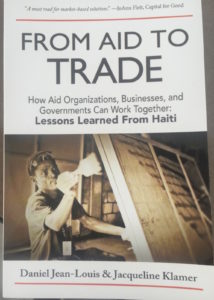Sometimes you need to read the last chapter of a book first.
I’m not talking about novels: that’s cheating and not nearly as much fun as trying to figure out what’s going to happen. I’m talking about non-fiction books that tie all the loose ends together in the final chapter. If you don’t know ahead of time that everything was based on actual events, you might not bother finishing the book at all. 
A Guatemalan friend recently gave me a copy of “Doing Good . . . Says Who?” It is described as “Stories from volunteers, nonprofits, donors, and those they want to help.” It is an easy read that is most effective when you read the last chapter first. It addresses on a personal level some of the business problems Daniel Jean-Louis, discusses in his book “From Aid to Trade: How Aid Organizations, Businesses, and Governments Can Work Together: Lessons Learned from Haiti.” Together they provide interesting and critically important insights into the work of non-profits around the world.
Jean-Louis does not mince words when he tells the story of Auguste Savonnerie whose thriving soap business had to close its doors in 2011 when the U.N.’s distribution of free soap bars following the cholera outbreak in Haiti flooded the market and wiped out his business. Unfortunately, this is not an isolated story. Time and again non-profits, in an attempt to help, have done serious harm to the local economy by bringing supplies in from donor nations instead of buying them locally. Ironically, the cholera epidemic was caused by the poor sanitation practices of UN military forces. The United Nations imported an overwhelming amount of soaps and other substitute products to combat the disease but that had a serious negative impact on the local economy.
Auguste Savonnerie’s family had owned and run their soap business for three generations. They regularly invested in research to make the best soap possible to meet the local’s needs and they invested in their employee’s needs too. They even helped their local competitors whose distribution network wasn’t as good as their own. Jean-Louis does not cite this example to shame non-profits, but rather to illustrate the need for them to buy locally whenever they can to protect the local economy. This chapter alone is worth the price of the book, but there is much more to it than that. Jean-Louis does a good job of laying out ways for aid organizations, businesses, and governments to work together.
I’ve been to Guatemala many times and can relate to the experiences and lessons Connie Newton and Fran Early share in “Doing Good . . . Says Who? I’ve never been to Haiti, but I’m looking forward to meeting Daniel Jean-Louis on Saturday, April 22nd when he talks about the lessons in From Aid to Trade at the Festival Center and you are invited to meet him then too.
 The event is free, but we do ask you to register for it ahead of time which you can do easily here on line. We encourage you to do that today and your friends are welcome too.
The event is free, but we do ask you to register for it ahead of time which you can do easily here on line. We encourage you to do that today and your friends are welcome too.
Both these books provide important insights that can be applied to short and long-term mission projects and both of them include valuable bibliographies.
In his book, Hawaii, James Michener tells the story of missionaries who went to Hawaii to do good and did well, financially that is. Let it not be said of us and our non-profits that we went to other countries to help them and helped ourselves instead.
Blessings for the Journey,
Judy Osgood